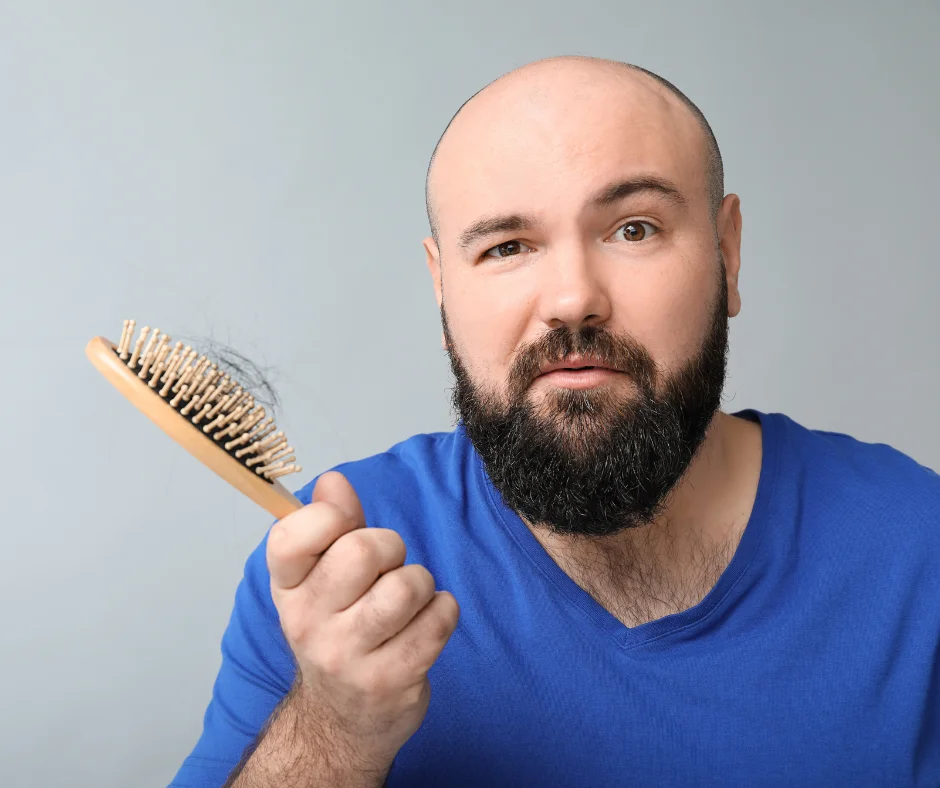
May 6, 2025
Seeing extra hair on your pillow, in the shower drain, or noticing a receding hairline can be unsettling, but it's a concern shared by many men. This visible change naturally prompts a search for answers, and hormones often enter the conversation. While genetics and other factors play a role, the question inevitably surfaces regarding the male hormone: Does low testosterone cause hair loss?
Testosterone is the primary male sex hormone, responsible for many masculine characteristics, from muscle mass and bone density to sex drive and mood regulation. It plays a vital role throughout your life. However, when we talk about the most common type of hair loss in men, androgenetic alopecia, testosterone itself isn’t the direct cause.
The primary role is carried out by a testosterone derivative called Dihydrotestosterone (DHT). Here’s how it works:
It’s crucial to understand that it is primarily the sensitivity of your hair follicles to DHT, not necessarily the amount of testosterone or DHT you have, that drives male pattern baldness. Even someone with low testosterone and hair loss could have hair follicles highly sensitive to DHT, whereas someone with higher levels of testosterone might not experience hormone-related hair thinning if they lack this genetic sensitivity.
So, if DHT sensitivity is the main culprit, does low testosterone cause hair loss at all? Low testosterone is not considered a primary cause of androgenetic alopecia. In fact, it might seem counterintuitive, but some men notice hair loss becomes more apparent after starting Testosterone Replacement Therapy (TRT). Because TRT increases the available testosterone, which can then be converted to DHT. If you have those genetically sensitive follicles, introducing more testosterone (even to bring levels back to normal) can potentially accelerate the miniaturization process that was already predetermined by your genetics.
This also busts a common myth: High testosterone does not automatically equal hair loss. Testosterone and hair loss can be connected. While having more testosterone provides more substrate to potentially convert into DHT, if your follicles aren’t genetically sensitive, you won’t experience typical male pattern baldness simply because your testosterone levels are high.
However, hormones are complex and interconnected. While low testosterone doesn’t directly cause the pattern of balding associated with DHT, significant hormonal imbalances or the underlying conditions causing low testosterone can sometimes contribute to other types of hair shedding or changes in hair quality.
Severe testosterone deficiency might, in some rare cases, lead to a general reduction in body hair, but it’s typically not the driving force behind the classic receding hairline or thinning crown seen in male pattern baldness. The bottom line is that if you’re experiencing hair loss, simply assuming it’s due to low testosterone is often inaccurate. A thorough evaluation with Dr. Ambay is needed to understand the true cause and determine whether testosterone and hair loss is relevant for you or if another issue is at play.
The good news is that regardless of the exact cause if your hair loss is bothering you, there are effective techniques available at Ambay Plastic Surgery. The first step is an accurate diagnosis; from there, a comprehensive treatment plan can address your low testosterone and hair loss questions or other hormone-related hair thinning causes.
Navigating the world of hair loss treatments can be overwhelming. Dr. Ambay is a double board-certified surgeon and recipient of the prestigious Plastic Surgery Educational Foundation Award, making him an excellent choice for hair restoration. He employs advanced diagnostic methods and treatments that target your underlying needs, promoting fuller, healthier hair. With his meticulous approach and commitment to patient well-being, you can expect comprehensive guidance and lasting results. Trust in Dr. Ambay’s proven track record and compassionate care to address your hair loss concerns with the expertise you deserve.
Ready to address hair loss concerns? Contact our office today to schedule your personalized consultation with Dr. Ambay and discover effective solutions for a fuller, healthier head of hair.
Dr. Ambay is a double board-certified plastic surgeon who specializes in cosmetic surgery of the face and body. He performs a wide range of aesthetic treatments at his Florida practice.

Double Board-certified plastic surgeon

Most importantly a surgeon who truly cares and takes pride in his work

Advanced technology and surgical technique

Highest standard of precision and care

Awarded the President’s Award from the American Society of Plastic Surgeons

Extensive expertise

Dr. Raj Ambay is a well respected and trusted surgeon in Wesley Chapel. His work speaks for itself when you look at his patients’ before and after photos. Call 813-406-4448 and book your appointment to discuss the concerns that you may have.
Ambay Plastic Surgery is conveniently located in Wesley Chapel and frequently serves patients from all over the surrounding Tampa Bay area and beyond.